Of the films I’ve reviewed this month, Andrew Currie’s Fido is the best example of Hardly Horror. Despite a movie that features the dead coming back to life, necrophilia, patricide, parental neglect, and life in a dystopian state run by a corporation, Fido contains not even a hint of horror or darkness. The movie feels more akin to Lassie mixed with 1984 than Night of the Living Dead, or even Shaun of the Dead. The only time Fido feels like a zombie film is during a few scenes of zombies attacking people, and surprisingly enough, the film works-more than any film about a boy and his pet zombie should ever work.
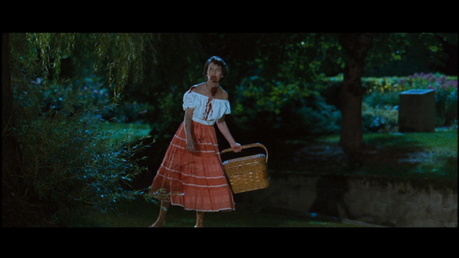
The Only Scene Of A Zombie Outbreak In A Film About A Zombie Outbreak
Sometime in the past of an alternate universe, the dead start coming to life due to radiation from outer space, leading to a great “Zombie War”. Fortunately, a company called ZomCom appeared and created a collar that can control a zombie-effectively turning it into the owner’s slave. While this ended the Zombie War, America has been reduced to walled in city states ran and operated by ZomCom. In between the cities are “wild zones”, where zombies run free and a place where criminals are sent, as opposed to prison. It is in this world that we meet Timmy Robinson (K’Sun Ray [yes, that’s his real name]), a boy who has a hard time fitting in with the world. He’s considered weird by his classmates, his mother, Helen, (Carrie-Ann Moss) is obsessed with how others perceive the family, and his father, Bill, (Dylan Baker) is an emotionally repressed man who would rather spend time with his golfing buddies than his family. All that changes when the Robinson’s get their first zombie, who Timmy names Fido (Billy Connolly). At first they see him as just a slave, but after Fido saves Timmy from some bullies, he and Timmy form an unlikely friendship- and eventually Fido even wins over Mrs. Robinson. Their bonds are put to the test, however, when Fido starts a mini-outbreak after his control collar is accidentally deactivated and he kills an old woman.
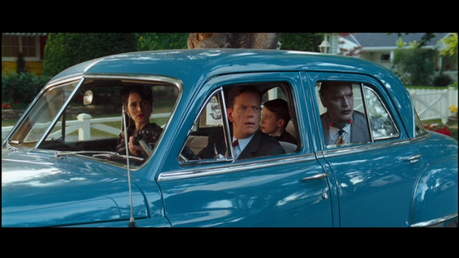
Trouble is brewing
The zombies in this movie are probably the most interesting depictions I’ve ever seen: in a way, they’re a mix of the pre-Romero zombies and the post-Romero zombies. Until they’re saddled with the collar, they hunger for human flesh and act like wild beasts, but once they’re under the collar’s control, they act much like the Hoodoo version of zombies-sentient, but without a will of their own. Even more interesting, the zombies feel emotions, and can form reciprocated relationships with the living. This type of zombie is key to the movie’s success, keeping the zombies a threat, but allowing them to become characters, rather than plot devices.
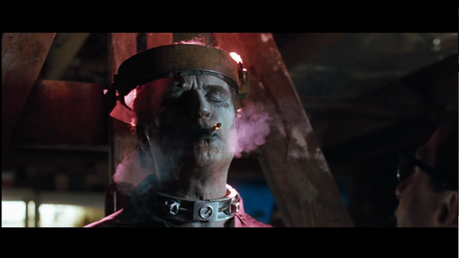
He’s Dead, I Don’t Think Smoking Can Do Much Worse To Him
While you’re watching this movie, you may not realize at first how unbelievably horrifying the world of Fido is. Everyone lives in constant fear, because once someone dies, they come back to life, ready to kill. People don’t trust the sick or elderly, people are afraid to get close to their friends and relatives that they may have to kill, and children are taught how to perform a proper headshot in school. Once you die in this world, you can expect an afterlife of slavery, as only those who can afford ZomCom approved funerals have the luxury of coming back (funerals not performed by ZomCom are illegal). Even worse, ZomCom controls everything, even governmental functions, so the inhabitants have no say in how everything is run. This darkness is painted over with the film’s visual style: a saccharine, Technicolor world that perfectly mimics the melodramas of the fifties. Helping matters is the fact that this takes place well after this world has been established, so the lack of freedom and safety is viewed as mundane by the characters.
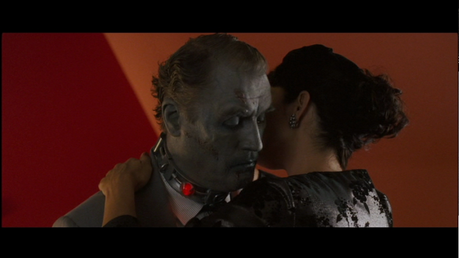
This Is Way Creepier Than It Looks
While Currie and writers Robert Chomiak and Dennis Heaton created a wonderful and believable world, there are a few issues with the plot: namely character development. First off, Timmy has almost no emotional reaction when Fido kills people; true, he isn’t happy that they died, and the victims did deactivate the control collar (some intentionally, some not), but Timmy feels no overwhelming sadness, nor does he feel any moral dilemma over possibility that keeping Fido alive could lead to more deaths. To a point, I can understand this, as he is a kid, and may not fully comprehend the consequences of what happened, but it does make him less sympathetic. Another problem is that Helen’s transformation from a woman obsessed with reputation to a free spirited woman who longs for emotional fulfillment which she finds with Fido also seems rushed-there’s a scene where she has a connection with Fido, and then gets annoyed with her husband, and that’s enough for her to stop caring about appearances apparently. The character with the biggest leaps of development logic is the antagonist’s daughter, Cindy Bottoms (Alexia Fast), who is introduced as if she was going to be Timmy’s love interest, then disappears from the movie altogether (save for one dialogue free scene), and then suddenly reappears in the movie, ready to betray her father and help Timmy. It feels as if the filmmakers didn’t have enough time/money to film all the scenes that would show us proper character motivation, so the characters’ actions sometimes feel as if they’re coming from left field.
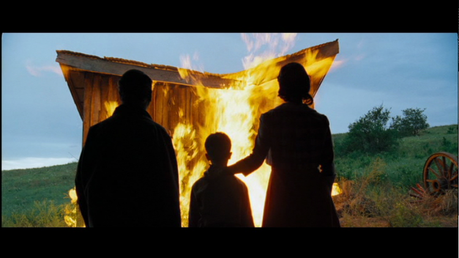
The Robinsons’ Normal Reaction To Getting Invites For Cocktails
If you’re looking for a fun, accessible, Hardly Horror Movie, Fido is your best bet. It has a dark and twisted world, and yet even those who get scared by Scooby-Doo wouldn’t find it frightening. The jokes are subtle and funny, the visual style (including props and sets) is a dream to look at, and while the characters may seem a little murky at times, the actors all do a superb job. Most of all, Fido is a movie with lots of charm, and a huge heart-albeit one that’s stopped beating.

